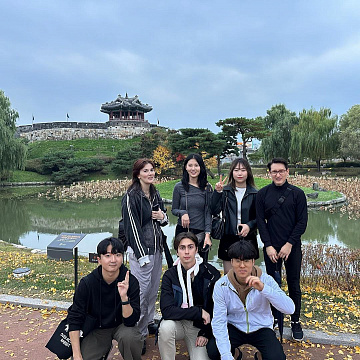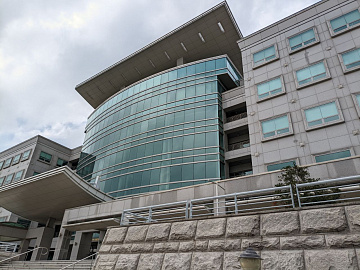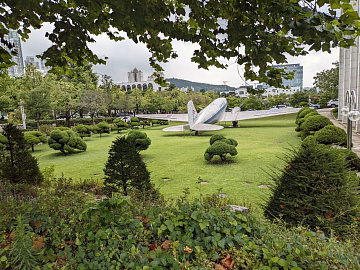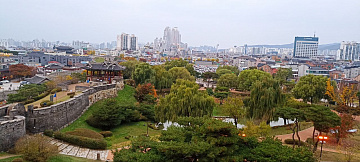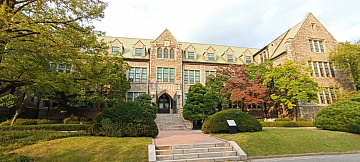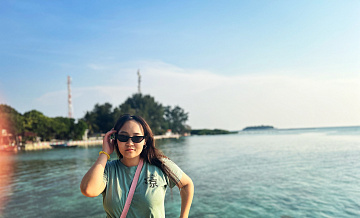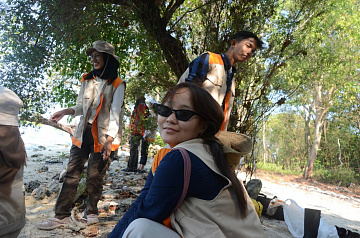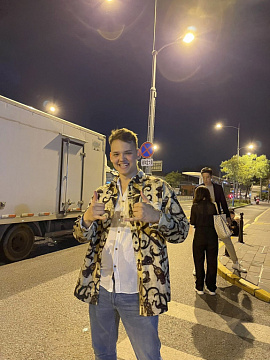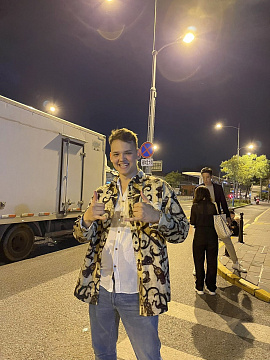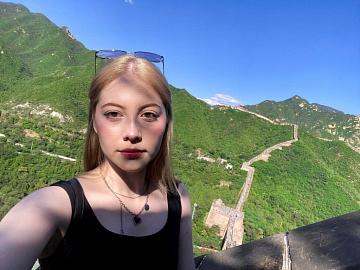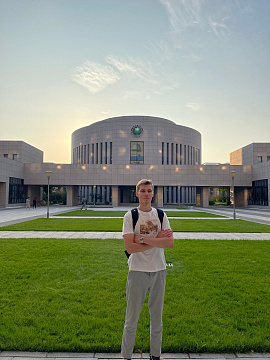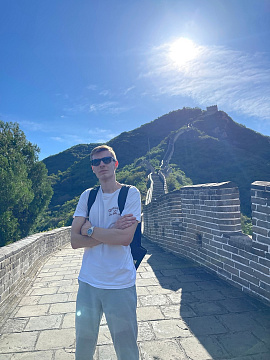
My impressions of the internship are positive. Thanks to the internship, it was possible to improve both language and professional skills thanks to the courses. I also think it helped me to improve my soft skills by giving various presentations and getting to know a lot of people.
What difficulties did you face during the stages of preparation for your internship? What advice and recommendations can you give to future participants of the academic mobility program?
- I advise you to study the list of documents and the requirements for them so that you do not have to redo them, and also take care of how it will be more convenient for you to transport money, since at present almost all Russian bank cards in Korea do not work.
Describe the process of obtaining a visa. Your tips for future participants of the academic mobility program.
- Personally, the process of obtaining a visa went absolutely smoothly for me. I advise you to make an appointment at the embassy by mail in parallel with the collection of the necessary documents, because it is possible to collect them quite quickly if there is an invitation from another university, and the appointment will be made in a week at best. However, if you are not from Irkutsk, then in order to get a certificate from the tuberculosis dispensary, you may need a request about the lack of registration in your hometown, and it may take a couple of weeks to receive the results of the request.
What difficulties were encountered upon arrival at the host foreign organization? Your advice to future participants of the academic mobility program.
- One of the main difficulties at first is the inability to issue a bank card for non-cash payments. To apply for a card, you must have an ID card. I applied for it in the first days of September, and received it in the second half of November. I solved this problem by applying for a UnionPay card in a russian bank that was not under sanctions, after which I could only use it to withdraw money from an Global ATM, and then top up the Wowpass tourist card, the machines of which are located in Seoul and other popular tourist places in Korea.
Indicate your expenses related to participation in an overseas internship (visa costs, flight/travel costs to the place of internship, registration fees/taxes/taxes at the host organization, policy/medical services, if used, public transport, food, accommodation. Your tips for reducing costs.
Visa: 80 dollars.
Round trip flight: about 65000 rubbles
Medical insurance: 3000 rubles for September, then price changed to 5000 rubles per month.
Metro: 100 rubles per trip, but there is a system of discounts for transfers, etc.
Accommodation in a dormitory with one meal per day ticket: 80000 rubbles
Due to the change of environment, you can get sick despite good weather, so it is advisable to bring medication with you. The insurance that I got through the university covered only a relatively small part of the expenses, so the medications that I brought with me helped me a lot.

I am very glad that I had the opportunity to study exchange at the Technological University in Bandung, Indonesia. Overall, the impressions from this experience remained positive.
Bandung is a unique city with a rich history, beautiful nature and friendly people. I visited various attractions and tasted the national cuisine, got acquainted with the local culture and traditions.
At the expense of my studies, the university offered me a wide range of subjects related to my specialty. I have studied new methods and approaches in the field of technology, which has had a positive impact on my knowledge and skills. The students and teachers at the university were very friendly and open, which helped me easily adapt to the new environment. I also had several different projects that allowed me to develop and improve my skills.
The exchange training was useful for me not only from an academic point of view, but also personally. I became more independent and adaptable, as I independently solved many everyday tasks related to living and studying in another country. I developed communication and cultural interaction skills as I met and communicated with people from different countries and cultures. In general, the exchange training helped me become more self-confident and independent.
What difficulties did you have during the preparation stages for the internship? What advice and recommendations can you give to future participants of the academic mobility program?
The difficulties were only in paying for a visa, the website through which it was necessary to pay for an entry visa did not work due to sanctions, but we found a person who helped us. My advice is to start collecting documents in advance, as there may be unforeseen circumstances with a passport or visa, so that there is time to solve problems.
Describe the visa application process. Your advice for future participants of the academic mobility program
To study, you will need 2 visas: an entry visa and a six-month stay visa (KITAS). The entry visa is done through ITB curators who help you. It is done for 2-3 months. KITAS is done for about a month, upon arrival you need to contact the immigration office to apply for it. I advise you to start preparing and collecting documents earlier.
What difficulties did you have upon arrival at the host foreign organization? Your advice to future participants of the academic mobility program
Upon arrival in Indonesia, there were no problems, there were a couple of problems during the flight. There are some unforeseen circumstances. At such moments, the main thing is not to panic and keep yourself in control.
Specify your expenses related to participation in an internship abroad (visa costs, cost of flight / travel to the place of internship, registration fees/ taxes/ deposits in the host organization, policy / medical services, if used, public transport, meals, accommodation. Your tips for cutting costs
Before leaving, I paid more than 18 thousand for a visa, after arriving I paid for ITAS (residence permit for 6 months) 10 thousand. The insurance came out at 28 thousand. Tickets there went out at 41 (I took the cheapest ones). I also paid about 24 thousand (six months) for accommodation. Tickets from Jakarta to Bandung cost about 1200-1500 rubles. It took me about 100 thousand to live, for six months. And the tickets went back to 40 thousand (also the cheapest).
I am very happy with my exchange program at Beijing Institute of Technology. During the time I spent there, I improved my Chinese language and gained knowledge in Economics. During my 4 months there, I lost 12 kilograms of weight because I had a very active lifestyle. In the future I would definitely like to go back to China for a Master's program.
What difficulties did you encounter at the stage of preparation for the internship? What tips and recommendations can you give to future participants of the academic mobility program?
At the stage of preparation for the internship, I and other students had difficulties with paying registration fees at the Chinese university, as the functionality of Russian payment systems is now limited. Check the expiration date of your passport in advance, you should have a few months to spare, my passport expired a few days before the day of departure from China. Because of this I had to change my passport and I got my visa, literally, on the day of departure from Russia.
Describe the process of obtaining a visa. Your advice to future participants of the academic mobility program
I got my visa under expedited mode, so I had to pay 5000 rubles for it instead of 3000. In general, the documents I needed were a visa application form, an original letter of enrollment from a Chinese university, and a few other small papers. The process was simple.
What difficulties were encountered upon arrival at the university? Your advice to future participants of the academic mobility program
We were very happy that we were picked up from the airport and helped with registration, SIM card and dorm check-in, getting to the university on our own could have been a huge hassle. Prepare before traveling, download useful apps like WeChat, Alipay and Baidu Maps for navigation, also install a VPN for Viber, Whats'App and Telegram to work. VK works without a VPN.
Indicate your expenses related to participation in an overseas internship (visa costs, flight/travel to the internship site, registration fees/taxes/taxes at the host organization, policy/medical services, if any, public transportation, meals, accommodation. Your tips for reducing costs.
Travel to the place of training back and forth = 150r; One meal = 150r; Airplane ticket = 15000-25000 one way; Registration fee = 5000, Medical insurance = 5000. SIM card = 4000. Most of the money was spent on buying things. In general, life in China is not expensive.
I am extremely glad and thankful to have been granted the opportunity to live and study in China for 4 months, get to know its unique culture and make unforgettable memories! Naturally, I managed to improve my Chinese skills, especially my ability to comprehend speech by ear. I also managed to overcome language barrier and started to be more confident about my Chinese. University life introduced me to the way subjects are taught and exams are organized in China.
What difficulties did you encounter during the stages of preparation for the internship? What advice and recommendations can you give to future participants of the academic mobility program?
Probably the biggest challenge for me was to find a bank which card would work in China, so that I could transfer money in rubles and withdraw yuan. Eventually, I’ve chosen Gazprombank’s UnionPay card and had no problems with card payments or money withdrawal in any of Beijing’s banks.
Describe the process of obtaining a visa. Your tips for future participants of the academic mobility program.
I’ve prepared all required documents, filled out the visa application form on the website of Chinese embassy. On the appointed day, I arrived one hour earlier than opening time of the embassy and queued. When my time came, I entered the building, submitted all documents, scanned my fingerprints. After that, I went to pay for visa in the bank Solidarnost and a week later I claimed my visa. No problems occurred at any of the stages.
The only useful advice I can get is to check twice whether the documents you prepared are in order.
What difficulties were encountered upon arrival at the host foreign organization? Your tips for future participants of the academic mobility program.
I do not recall encountering any difficulties upon arrival at the university: everything went quite smoothly, starting with a meeting at the airport and ending with a warm welcome at the university. It may be worth mentioning that at first I was somewhat scared off by the condition of the dormitory in which I was to live, but after spending a couple of days cleaning the room, and then ordering several decor items, my neighbors and I managed to create a quite cozy place.
Quite a valuable advice, in my opinion, is not to get upset straightaway if something disappoints you a little or doesn’t match your expectations. You can always try to solve the problem with the help of people fr om the organization you’ll be staying in, and sometimes even on your own (as we did).
Indicate your expenses related to participation in the foreign internship (visa expenses, flight/travel costs to the place of internship, registration fees/taxes/taxes in the host organization, policy/medical services, if used, public transport, meals, accommodation. Your tips for reducing costs.
An airplane ticket to and from Beijing cost me around 30 thousand rubles each. I don't remember exactly how much it cost to get a visa, but this amount did not exceed 3-4 thousand rubles. I did not use any medical services, but I paid for insurance for six months – 400 yuan.
I mainly used three means of transport: a one-time trip on a university bus from one campus to another cost 6-9 yuan; the cost of a subway ride is calculated depending on the number of stations, but on average it was 5-7 yuan; buying a card that allows you to rent a bicycle not limited number of times per month cost me about 15-20 yuan. I highly recommend that you figure out how to use the bike rental system and use this very means of transport as often as possible, because it is not only healthy and cheap, but also since it is much more interesting to explore the city by bike!
There are many different canteens on the territory of the campus in which a full meal costs around 15 yuan. You can also buy food and cook on your own, the price of some products is slightly higher than in Russia, but usually the prices are reasonable. In addition, you can order food in the app, and it will be delivered to special delivery lockers at the university. On average, one order amounted for 30-40 yuan, but it can be cheaper if you use discount coupons!
Accommodation in the dormitory was free: we only had to buy bedding sets (we did this on the first day on campus, and a set of a thin mattress, a blanket, a pillowcase, bedsheets and a pillow cost us 400 yuan). Later, my neighbors and I ordered a pillow on taobao for 10 yuan, and it was very comfortable to sleep on! Speaking of taobao, I strongly advise you to create an account there in the first days of your stay in China, and if you encounter any difficulties, do not hesitate to ask Chinese students for help. During all 4 months I spent there, everybody was friendly and ready to help. On this website you can order everything you may need for a comfortable life in a dormitory: bed linen, dishes, a dryer and a steamer for clothes and even a portable saucepan! The main thing is to control your spending and learn to lim it yourself, because Taobao offers almost everything one might need.
The impressions are mostly positive, a huge amount of experience as a result of the internship. The acquired skills in technical sciences and communication skills with people will help me in my future profession.
What difficulties did you encounter during the stages of preparation for the internship? What tips and recommendations can you give to future participants of the academic mobility program?
The deadlines for obtaining a foreign passport have been delayed, it is better to apply for a foreign passport in advance.
Describe the process of obtaining a visa. What are your tips for future participants of the academic mobility program?
You need to see in advance what documents are required, collect them and bring them to the consulate to obtain a visa. In advance, you need to sign up on their website and calculate the time of issuance so that you have time to submit it to the host organization.
What difficulties did you encounter upon arrival at the host foreign organization? What are your tips for future participants of the academic mobility program?
The only difficulty was finding non-spicy food and the fact that the other campus (Liang Xiang campus), where most of the classes took place, was a two-hour drive from where we were accommodated.
Indicate your expenses related to participation in the internship abroad (visa expenses, cost of flights/travel to the place of internship, registration fees/taxes/deposits in the host organization, policy/medical services, if used, travel in public transport, meals, accommodation.
The flight is at the expense of "Travel Grant" from INRTU. Dormitory - at the expense of BIT (host party), registration fees/taxes/deposits at the host organization, policy/medical services - at the expense of personal funds. Public transport, meals and accommodation are at the expense of personal funds.



